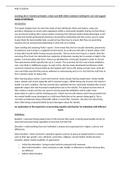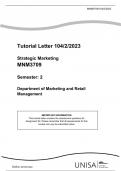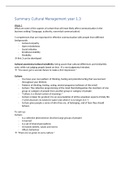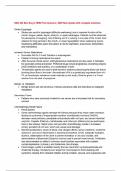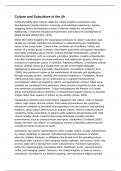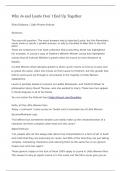Milly O’Sullivan
Learning aim A: Examine principles, values and skills which underpin meeting the care and support
needs of individuals.
Introduction
This report displays how we meet the needs of two individuals, Aisha and Valarie, using care
practices, following my recent work experience within a community hospital. During my time there, I
was involved in looking after various adults recovering from illnesses before being discharged. It will
include how health professionals develop a trustworthy relationship with the service users in order
to give them the best possible help, as well as how they have to ensure that they are promoting
equality and not acting biased depending on who they are treating.
Upon reading and analysing Aisha’s report, I have noted that she has vascular dementia, pneumonia,
incontinence and is living in a neglectful environment. As an 82-year-old with no family, Aisha is left
to look after herself whilst having vascular dementia. This has led to her living in a chaotic, dirty flat
surviving off no food. Her dementia has symptoms of delusions causing her to wander at night in the
garden, communicating with them. Aisha was admitted the community hospital in order to recover
from pneumonia which typically lasts up to 2 weeks. The treatment for this may include antibiotics,
rest, more fluid or additional oxygen. As well as this, she has newly developed incontinence which
cannot be treated but instead aided by the hospital staff. Due to this being a private issue, both the
carer and Aisha may find the process awkward or embarrassing and so it is vital that the staff tries to
form a bond in order to reduce this.
After learning about Valarie, I have seen that her needs include hearing impairment, mental health
issues, obesity and a burst appendix which required surgery. Whilst being only 24 years old, Valarie’s
health is in poor condition. She has recently been admitted into the community hospital after a burst
appendix surgery that had increased complications due to her obesity. The typical recovery time of
this is below 2 weeks and she may need to receive powerful antibiotics and be under close
observation in order to aid this healing process. Valarie has low self-esteem which has sprouted from
her mental health issues developed as a child most likely due to her parents dying aged 6. She is
currently unemployed, living off benefits within a council flat - however, she does not enjoy living
there after being constantly bullied by local teenagers about her obesity.
An explanation of the importance of promoting equality and diversity for individuals with different
needs
Definitions
Equality = everyone having equal access to the services they need, receiving equal quality service to
meet their personal needs regardless of how they live their life.
Diversity = understanding that each individual is unique and respecting their religion, cultures and
differences.
Discrimination = when someone is prejudice against a person or group of people based on reasons
such as their age, gender, race, ethnicity, social class, religious/ secular beliefs, family structure,
sexuality, ability, health, disability, or appearance.
o Unfair discrimination - being treated unfairly compared with someone
o Direct discrimination - when someone is rude, hostile, or offensive to another because they
are different
o Indirect discrimination
,Milly O’Sullivan
o Positive discrimination - when a decision is made in someone’s favour because there is
something different about them
Anti-discrimination = being opposed to treating someone unfairly because of their differences.
Nine protected characteristics:
o Age
o Disability
o Gender reassignment
o Marriage and civil partnership
o Pregnancy and maternity
o Race
o Religion or belief
o Sex
o Sexual orientation
The promotion of equality, diversity and anti-discrimination.
Health and social practitioners must promote equality in order to allow all service users to receive
the same quality treatment. This being said, not all service users need the same services or for the
same period of time, however they must be able to have equal access to treatments if and when it’s
necessary. The service providers should account for their beliefs and abilities in order to make the
service users feel safe, welcome and accommodated for. The Equality Act 2010, legally prevents
people with certain characteristics from being discriminated against, therefore meaning is it a legal
requirement to treat everyone fairly. However, doing so is extremely crucial for health and social
workers since they are taking care of a variety of people. Those with disabilities and illnesses (both
mental and physical) or those limited by factors such as their age, gender, sexuality, must all be
tended to using the same practises, medication and techniques that more advantaged individuals
would.
The promotion of equality strongly applies to both Aisha and Valarie. Since Valarie suffers from
mental health issues and low self-esteem which are already weakened due to the frequent bullying
that occurs from the local teenagers, she may be considered a more sensitive, vulnerable individual.
This may mean that she is more probable to notice when she is treated unfairly, possibly causing her
to feel worried. As well as her mental health, her physical health is also limited. Both her appendix
surgery and her obesity can prevent her from doing certain activities due to her strength being
weakened. Besides this, it is also necessary to promote equality for Valarie due to her rights as a
citizen.
Aisha must be treated equally to those of other ages or of more advanced mental ability. Due to her
dementia and the delusions that come from it, she may experience greater confusion of the care
received, and so service providers may have to adapt in the way they phrase or do things in order to
ensure she understands. This will make her feel more included and valued which is vital for service
users as their comfort affects the service quality. Additionally, Aisha’s recently developed
pneumonia and incontinence which has a negative impact on her physical capability and she
therefore may require additional support. Her age, gender and religion may influence the treatment
that is suitable for her and so the carers must take these factors into consideration.
Workers in the health and social care sector must also promote anti-discriminatory care by treating
people equally and being opposed to others who act otherwise. Having a service provider who
, Milly O’Sullivan
respects and accommodates for your differences can help you feel more comfortable which may
result in better fitting service as you feel more willing to open up. Service users who face
discriminatory acts can experience loss of confidence and low self-esteem which can then lead to
withdrawal from social activities. There are also other affects such as developing stress and in more
severe cases depression and anxiety. As well as this, anti-discriminatory behaviour and movements
produce more people to share these opinions as they are now aware of the damage having a
negative mindset can cause to both individuals. By living in an accepting society those with one or
more traits within the nine protected characteristics can feel more confident without the fear of
being discriminated against.
Anti-discriminatory behaviour can benefit Aisha due to her age because she may be treated with
lower quality treatment or it may cause her to not be prioritised over a younger patient in equal
positions, making her feel less valued. The specialists could make judgements on her based on this
believing that she can or cannot do things due to her age, when this may not be the case. Both her
gender and religion can also sometimes affect the way she is treated due to those with certain
beliefs thinking other people, with perhaps differing religions or genders, deserve better quality or
faster treatment. However, by promoting inclusive attitudes and acts, Aisha can feel as though she is
equal to everyone else allowing her to be more content that the professionals will put her needs first
and respect her individuality.
Valarie can also be positively affected by anti-discriminatory acts due to her mental health issues.
Her low self-esteem could easily prevent her from seeking help or believing that she deserves the
treatment provided. Because of this, if Valarie does find help and is treated differently that other
patients due to her characteristics, it may worsen her mental condition and self-image causing her to
feel worthless. Especially due to the ongoing bullying from local teenagers, Valarie is in desperate
need of some confidence which is often a result of service providers giving equal respect. As Valarie
is currently worries about leaving the community hospital, by being treated without discrimination
she may develop some more self-worth and independence allowing her to feel more comfortable
and willing to return home.
Initiatives aimed at preventing discrimination - Aisha
Access
Aisha is currently recovering from pneumonia in the community care hospital. Average recovery
time is 2 weeks and includes rest, however, due to Aisha being 82, her side effects may differ. The
common symptoms include chest pain, coughing, fatigue, a fever (sweating, chills), nausea, vomiting
and diarrhoea. Those within later adulthood may experience additional symptoms such as confusion
or change in mental awareness, and a lower body temperature. Not only these mentioned, but other
effects of pneumonia and her general condition may cause reduced mobility and the professionals
working in the community hospital must therefore adapt in order to provide comfort. She may be
restricted to bed rest and so workers should bring her necessary food and entertainment suitable to
her condition (puzzles). Depending on how bad her condition is, Aisha may be placed in a
wheelchair. If this is the case, she should then be provided access to wider corridors, lifts or ramps,
disabled bathroom cubicles whilst still having the same opportunities as someone with increased
mobility. If in a wheelchair, the community hospital would promote equality and diversity as it shows
they are accommodating for people regardless of their age and condition. Aisha may also be placed
in a group among others in similar conditions to hers allowing them to socialise and share
experiences. Ultimately, by providing equal access and opportunities regardless of her age or illness,
they are being inclusive.
Learning aim A: Examine principles, values and skills which underpin meeting the care and support
needs of individuals.
Introduction
This report displays how we meet the needs of two individuals, Aisha and Valarie, using care
practices, following my recent work experience within a community hospital. During my time there, I
was involved in looking after various adults recovering from illnesses before being discharged. It will
include how health professionals develop a trustworthy relationship with the service users in order
to give them the best possible help, as well as how they have to ensure that they are promoting
equality and not acting biased depending on who they are treating.
Upon reading and analysing Aisha’s report, I have noted that she has vascular dementia, pneumonia,
incontinence and is living in a neglectful environment. As an 82-year-old with no family, Aisha is left
to look after herself whilst having vascular dementia. This has led to her living in a chaotic, dirty flat
surviving off no food. Her dementia has symptoms of delusions causing her to wander at night in the
garden, communicating with them. Aisha was admitted the community hospital in order to recover
from pneumonia which typically lasts up to 2 weeks. The treatment for this may include antibiotics,
rest, more fluid or additional oxygen. As well as this, she has newly developed incontinence which
cannot be treated but instead aided by the hospital staff. Due to this being a private issue, both the
carer and Aisha may find the process awkward or embarrassing and so it is vital that the staff tries to
form a bond in order to reduce this.
After learning about Valarie, I have seen that her needs include hearing impairment, mental health
issues, obesity and a burst appendix which required surgery. Whilst being only 24 years old, Valarie’s
health is in poor condition. She has recently been admitted into the community hospital after a burst
appendix surgery that had increased complications due to her obesity. The typical recovery time of
this is below 2 weeks and she may need to receive powerful antibiotics and be under close
observation in order to aid this healing process. Valarie has low self-esteem which has sprouted from
her mental health issues developed as a child most likely due to her parents dying aged 6. She is
currently unemployed, living off benefits within a council flat - however, she does not enjoy living
there after being constantly bullied by local teenagers about her obesity.
An explanation of the importance of promoting equality and diversity for individuals with different
needs
Definitions
Equality = everyone having equal access to the services they need, receiving equal quality service to
meet their personal needs regardless of how they live their life.
Diversity = understanding that each individual is unique and respecting their religion, cultures and
differences.
Discrimination = when someone is prejudice against a person or group of people based on reasons
such as their age, gender, race, ethnicity, social class, religious/ secular beliefs, family structure,
sexuality, ability, health, disability, or appearance.
o Unfair discrimination - being treated unfairly compared with someone
o Direct discrimination - when someone is rude, hostile, or offensive to another because they
are different
o Indirect discrimination
,Milly O’Sullivan
o Positive discrimination - when a decision is made in someone’s favour because there is
something different about them
Anti-discrimination = being opposed to treating someone unfairly because of their differences.
Nine protected characteristics:
o Age
o Disability
o Gender reassignment
o Marriage and civil partnership
o Pregnancy and maternity
o Race
o Religion or belief
o Sex
o Sexual orientation
The promotion of equality, diversity and anti-discrimination.
Health and social practitioners must promote equality in order to allow all service users to receive
the same quality treatment. This being said, not all service users need the same services or for the
same period of time, however they must be able to have equal access to treatments if and when it’s
necessary. The service providers should account for their beliefs and abilities in order to make the
service users feel safe, welcome and accommodated for. The Equality Act 2010, legally prevents
people with certain characteristics from being discriminated against, therefore meaning is it a legal
requirement to treat everyone fairly. However, doing so is extremely crucial for health and social
workers since they are taking care of a variety of people. Those with disabilities and illnesses (both
mental and physical) or those limited by factors such as their age, gender, sexuality, must all be
tended to using the same practises, medication and techniques that more advantaged individuals
would.
The promotion of equality strongly applies to both Aisha and Valarie. Since Valarie suffers from
mental health issues and low self-esteem which are already weakened due to the frequent bullying
that occurs from the local teenagers, she may be considered a more sensitive, vulnerable individual.
This may mean that she is more probable to notice when she is treated unfairly, possibly causing her
to feel worried. As well as her mental health, her physical health is also limited. Both her appendix
surgery and her obesity can prevent her from doing certain activities due to her strength being
weakened. Besides this, it is also necessary to promote equality for Valarie due to her rights as a
citizen.
Aisha must be treated equally to those of other ages or of more advanced mental ability. Due to her
dementia and the delusions that come from it, she may experience greater confusion of the care
received, and so service providers may have to adapt in the way they phrase or do things in order to
ensure she understands. This will make her feel more included and valued which is vital for service
users as their comfort affects the service quality. Additionally, Aisha’s recently developed
pneumonia and incontinence which has a negative impact on her physical capability and she
therefore may require additional support. Her age, gender and religion may influence the treatment
that is suitable for her and so the carers must take these factors into consideration.
Workers in the health and social care sector must also promote anti-discriminatory care by treating
people equally and being opposed to others who act otherwise. Having a service provider who
, Milly O’Sullivan
respects and accommodates for your differences can help you feel more comfortable which may
result in better fitting service as you feel more willing to open up. Service users who face
discriminatory acts can experience loss of confidence and low self-esteem which can then lead to
withdrawal from social activities. There are also other affects such as developing stress and in more
severe cases depression and anxiety. As well as this, anti-discriminatory behaviour and movements
produce more people to share these opinions as they are now aware of the damage having a
negative mindset can cause to both individuals. By living in an accepting society those with one or
more traits within the nine protected characteristics can feel more confident without the fear of
being discriminated against.
Anti-discriminatory behaviour can benefit Aisha due to her age because she may be treated with
lower quality treatment or it may cause her to not be prioritised over a younger patient in equal
positions, making her feel less valued. The specialists could make judgements on her based on this
believing that she can or cannot do things due to her age, when this may not be the case. Both her
gender and religion can also sometimes affect the way she is treated due to those with certain
beliefs thinking other people, with perhaps differing religions or genders, deserve better quality or
faster treatment. However, by promoting inclusive attitudes and acts, Aisha can feel as though she is
equal to everyone else allowing her to be more content that the professionals will put her needs first
and respect her individuality.
Valarie can also be positively affected by anti-discriminatory acts due to her mental health issues.
Her low self-esteem could easily prevent her from seeking help or believing that she deserves the
treatment provided. Because of this, if Valarie does find help and is treated differently that other
patients due to her characteristics, it may worsen her mental condition and self-image causing her to
feel worthless. Especially due to the ongoing bullying from local teenagers, Valarie is in desperate
need of some confidence which is often a result of service providers giving equal respect. As Valarie
is currently worries about leaving the community hospital, by being treated without discrimination
she may develop some more self-worth and independence allowing her to feel more comfortable
and willing to return home.
Initiatives aimed at preventing discrimination - Aisha
Access
Aisha is currently recovering from pneumonia in the community care hospital. Average recovery
time is 2 weeks and includes rest, however, due to Aisha being 82, her side effects may differ. The
common symptoms include chest pain, coughing, fatigue, a fever (sweating, chills), nausea, vomiting
and diarrhoea. Those within later adulthood may experience additional symptoms such as confusion
or change in mental awareness, and a lower body temperature. Not only these mentioned, but other
effects of pneumonia and her general condition may cause reduced mobility and the professionals
working in the community hospital must therefore adapt in order to provide comfort. She may be
restricted to bed rest and so workers should bring her necessary food and entertainment suitable to
her condition (puzzles). Depending on how bad her condition is, Aisha may be placed in a
wheelchair. If this is the case, she should then be provided access to wider corridors, lifts or ramps,
disabled bathroom cubicles whilst still having the same opportunities as someone with increased
mobility. If in a wheelchair, the community hospital would promote equality and diversity as it shows
they are accommodating for people regardless of their age and condition. Aisha may also be placed
in a group among others in similar conditions to hers allowing them to socialise and share
experiences. Ultimately, by providing equal access and opportunities regardless of her age or illness,
they are being inclusive.

